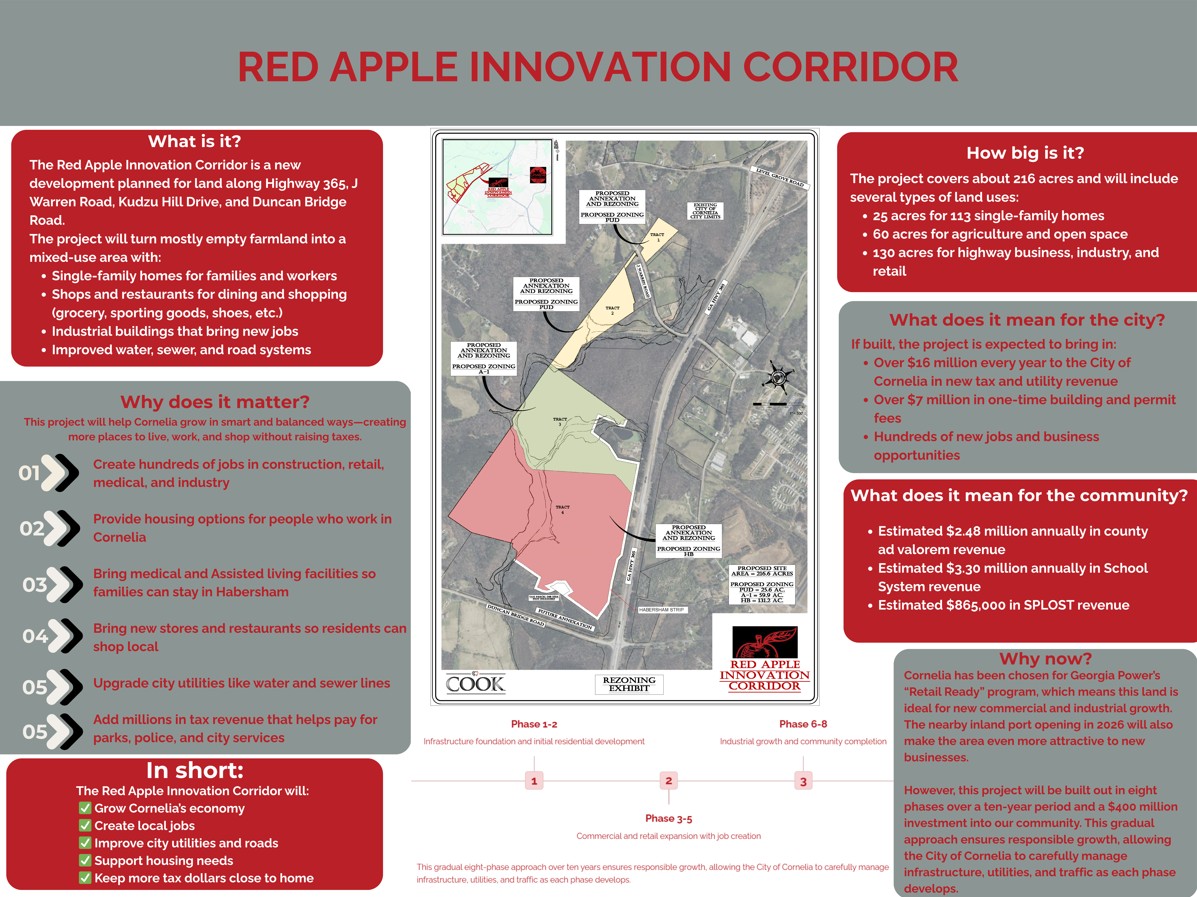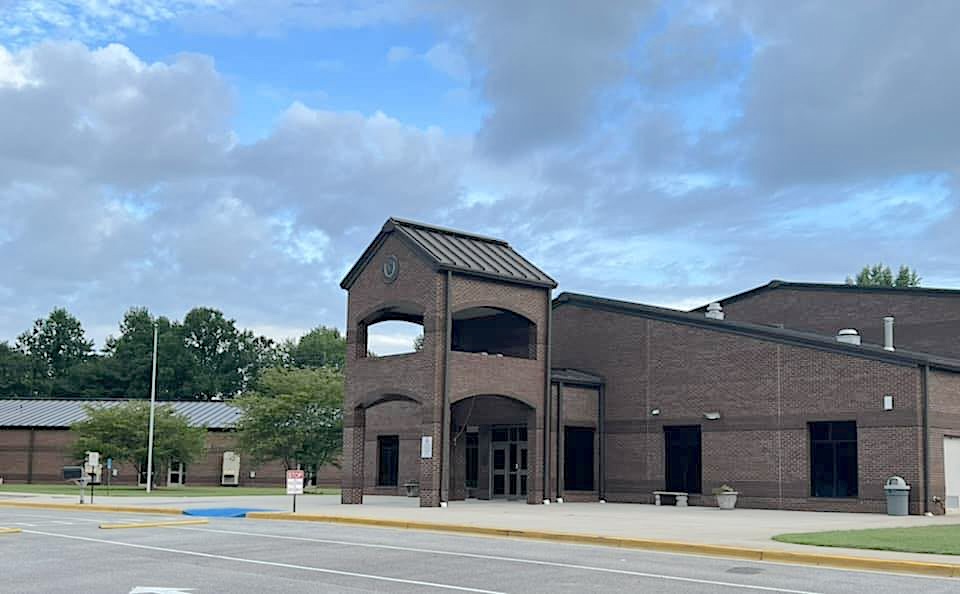Cornelia has entered the final stretch of a major annexation decision that would reshape the Highway 365 corridor and create the Red Apple Innovation Corridor. The project covers 216.7 acres and would add housing, commercial development, industrial sites, and land for public safety facilities. It has also become the focal point of a wider debate about growth, authority, and regional planning in Habersham County.

The Cornelia City Commission voted unanimously to advance the annexation ordinance. It opened it for public comment until December 2, when the city will hold one more public hearing before a possible final vote. No commissioners objected during the meeting.
The county also chose not to file an objection. County staff issued a memo that listed no objection, and the Board of Commissioners did not pursue arbitration. The county lacks water and sewer capacity in this part of the county. Under O.C.G.A. § 36-36-11, counties may object only when they can show that an annexation creates a conflict with service delivery. Counties rarely succeed in arbitration when they cannot serve the area in question, so Habersham allowed the matter to proceed.
Much of the local concern has centered on school capacity, the size of the project, and whether the plan conceals any effort to build a data center or prepare for future eminent domain.
Impact on Schools, Enrollment, and the Crisis Housing Crisis
Community and Economic Development Director Jessie Owensby notified the school district by certified mail, as required by state law. According to Owensby, the district did not object or respond to the city through official channels during the statutory window.
However, in response to Now Habersham’s request for comment, Assistant Superintendent David Leenman responded, “The potential annexation in Cornelia would strain the student capacity at the schools in the southern part of the county. The development upon completion could negatively impact student class sizes, transportation routes, and potentially even attendance zones. Habersham County Schools will continue to collaborate with local officials to study the impact of growth on the school system.”

Impact studies estimate that the project could generate as many as 151 students, with that growth occurring gradually over ten years. The district continues to assess how a new housing development will impact schools countywide. Yet any discussion of capacity in this area must start with the realities faced by the families who are already enrolled in Habersham County Schools.
State data shows that about half of the students at Cornelia Elementary are considered homeless under federal definitions. They live in unstable arrangements without a lease or mortgage. They stay in overcrowded rentals, converted structures, and motels. Many of the families who would move into new single-family homes, apartments, and townhomes already live in Habersham County. They would remain in the same school system whether the city approves the project or not.
Carrie Trotter, principal of Cornelia Elementary and a member of the city’s GICH (Georgia Initiative for Community Housing) team, has become one of the strongest voices connecting the city’s housing supply to the conditions inside local schools. She tells city officials that hiring teachers has grown more difficult because many candidates who want to work in Cornelia cannot find housing they can afford. Her experience shows that the housing shortage already affects school capacity, even before any new development takes place, because there is not enough affordable housing for families and teachers.
No, Eminent Domain Will Not Displace Existing Homes
The developer, Cook Communities, will build the project in phases over ten years. Cook will pay upfront for the extension of water and sewer lines, roadwork, internal streets, and stormwater improvements. Cook will also donate land for a police substation, a fire station, and a city park. The reimbursement for infrastructure will come directly from the tax revenue generated by the families who purchase the new homes and townhomes, a system that Alice Venter applauds. She also supports the city’s decision to prioritize single-structure affordable residential homes within the plan.
Alice Venter, Baldwin City Council member, has expressed support for several parts of the partnership between Cook Construction and the City of Cornelia as it currently stands, even as she raises concerns about language that some critics believe could create potential for eminent domain or other issues in the future. She has said that the development has the potential to bring value to the community. She also notes that the project will not displace existing homes.

Her concern about eminent domain is philosophical rather than procedural. She worries that the broad statutory language that defines “public use” in Georgia law could, in the hands of future leadership, be stretched to justify economic development takings. She agrees that the Red Apple project involves no such action and that no homes will be removed, and she continues to support several elements of the partnership as it exists today. Her focus is on whether future administrations might interpret growth language differently in times to come.
Jessie Owensby responds with the legal framework that governs eminent domain in Georgia. Under O.C.G.A. § 22-1-1 and the post-Kelo reforms, cities cannot use eminent domain for private economic development unless the General Assembly passes a new law. Owensby notes that nothing in the Red Apple plan triggers eminent domain and that neither current nor future administrations could legally use it for this project without a change in state law.
A portion of the site lies within a conservation easement. The easement allows the removal of some acreage for public facilities. Cornelia has a 4.8-mile gap in its fire and police coverage near Duncan Bridge Road, and the proposed stations address a long-standing service need. The easement language permits public facilities and utilities, so the acres donated by Cook Construction fall within its terms.
The Data Center Rumor
Rumors of a data center have circulated online, often framed as the hidden motive behind the annexation. A press release from the City of Cornelia, along with conversations with Owensby, makes clear that the developer reserved a portion of the property for a hypothetical facility only if city ordinances change and if significant future increases in infrastructure capacity occur. No company has contacted Cornelia about building a data center, and the city has not contacted any company. The city lacks the water and electrical capacity required for such a facility. The annexation does not authorize one.
Some of the debate has drawn from the history of a separate parcel on Level Grove Road that was once owned by the Church of God and later sold to private buyers. That property was annexed in 2024. The church provided a letter to the city that they contend affirms that the proper church authorities approved the sale by the required vote and that the Administrative Bishop authorized the transfer. The city holds the deed, which lists no use restrictions. Although this history has fueled online speculation, it does not bear directly on the Red Apple project. Now Habersham is reviewing the claims surrounding the earlier transactions, which occurred before the city annexed the parcel in 2024. However, these events are separate from the current proposal and do not involve Cook Communities or the Red Apple plan, a point that Venter also affirmed.
Policy Questions Raised by the Annexation
Some residents have suggested that the annexation was advanced quietly or without adequate notice. The record shows that Cornelia followed all legal procedures that govern annexation in Georgia. The city sent certified notices under O.C.G.A. § 36-36-7, advertised hearings under O.C.G.A. § 36-36-4, and placed the ordinance on the agenda for open meetings under the state’s Open Meetings Act. These steps satisfy the legal standard.
They also raise a broader question about whether statutory communication requirements keep pace with the ways residents access information. Legal notices in print newspapers, which require purchase to access, and posted agendas remain the mandated tools, but they assume reliable access to print media and frequent navigation of city websites. The debate around this annexation suggests that future policy discussions in Habersham County and across Georgia may focus on how cities communicate land use decisions in a civic environment that is becoming increasingly digital. Within the structures that exist today, the city met the requirements that the law sets.

The most persistent tension surrounding the project reflects broader questions about how Habersham County manages growth. Cities have broad authority under Georgia law to annex land when property owners request it. Counties can object only within narrow limits. Residents see the result when cities expand utilities and grow their tax bases while counties respond to the consequences for schools, roads, and services.
In this instance, however, because of the structure of the development agreement, city officials maintain that taxes will not increase for county residents. Cook Communities will cover the full cost of the roughly eighty million dollars in infrastructure that the project requires. The city will reimburse those costs only through the property taxes generated by the new homes and townhomes, not through the general fund. As families purchase these units, they contribute to the local tax base and increase spending in the county, which expands revenue without raising millage rates for existing residents.
This perceived imbalance shapes the debate more than any single feature of the Red Apple plan. It raises the question of who sets the direction for a county that spans several growing municipalities. Residents want assurances that long-term planning can keep pace with new development. They also want clarity when rumors outpace facts, which occurred throughout the early discussion of the annexation.
Cornelia officials say they remain open to questions from residents as the decision approaches. The city has invited the public to view documents, speak with staff, and attend the December 2 hearing at 6 PM. The process continues within the formal channels that govern annexation in Georgia. The outcome will determine not only the future of the Red Apple corridor but also the shape of Cornelia’s growth for the next decade.





